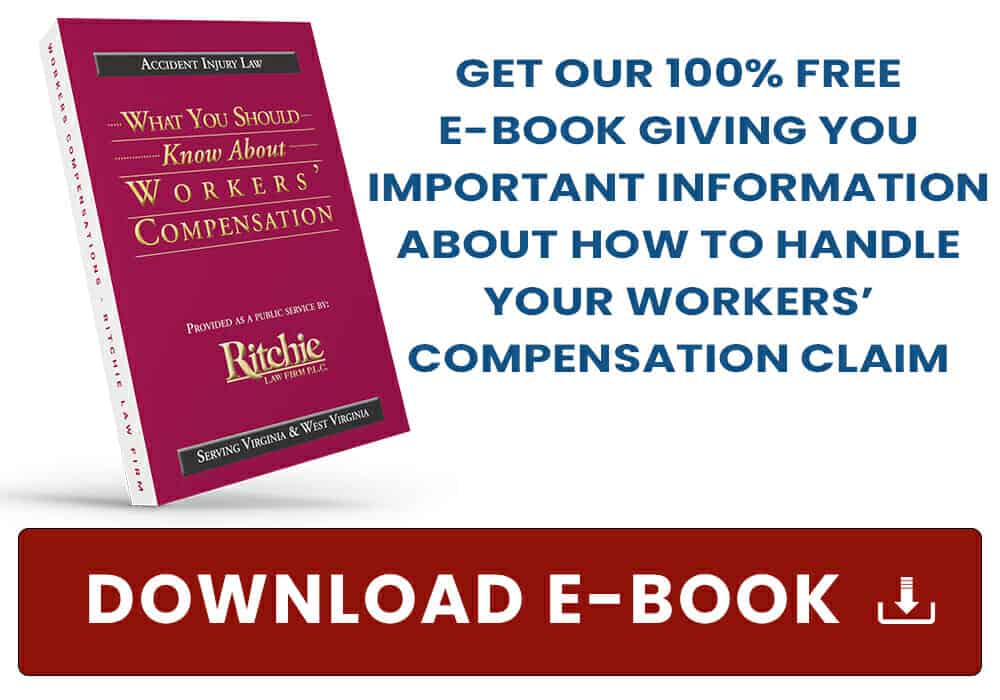Sustaining a workplace injury can turn your world upside down. Beyond dealing with physical pain and recovery, you’re likely concerned about how you’ll support yourself and your family while unable to work. Workers’ compensation benefits provide important financial support during this challenging time, but many injured workers don’t understand when these benefits might end or what rights they have when coverage stops.
At Ritchie Law Firm, our experienced attorneys have helped thousands of injured workers throughout Virginia and West Virginia navigate the complexities of workers’ compensation claims over the past 50 years. Understanding when your benefits might stop and what options remain available can make the difference between financial security and hardship.
What Are The Common Reasons Workers’ Comp Benefits End?
Workers’ compensation benefits don’t continue indefinitely, and there are several circumstances under which your coverage may be terminated or reduced. In both Virginia and West Virginia, benefits typically stop when you reach what’s called “maximum medical improvement” – the point where your doctor determines that your condition has stabilized and further treatment won’t significantly improve your recovery.
Your benefits may also end if you’re cleared to return to work, either to your original position or to modified duties that accommodate your injury. Insurance companies often push for early return-to-work arrangements, sometimes before you’re truly ready. It’s important to remember that you have the right to disagree with these determinations.
Another common scenario involves disputes over whether your injury is work-related or if you’ve developed complications unrelated to your original workplace accident. Insurance companies may argue that ongoing medical issues stem from pre-existing conditions or non-work activities, leading them to deny continued benefits.
What Are Independent Medical Examinations?
One of the most challenging aspects of workers’ compensation claims involves Independent Medical Examinations (IMEs). These examinations, requested by insurance companies, can significantly impact your benefits. The examining physician may conclude that you’ve reached maximum medical improvement or that you’re capable of returning to work, even when your treating physician disagrees.
IME doctors work for the insurance company, not for you, and their opinions can be used to justify cutting off your benefits. However, you have rights in this process. The findings from an IME are not automatically final, and you can challenge these determinations with support from your own medical team and legal representation.
Understanding Your Appeal Rights
When your workers’ compensation benefits are terminated or reduced, you don’t have to accept this decision quietly. Both Virginia and West Virginia provide appeal processes that allow you to challenge these determinations. Time limits for filing appeals are strict, so acting quickly is essential.
In Virginia, you generally have two years from the date of your last compensation payment to request a hearing before the Virginia Workers’ Compensation Commission. West Virginia has similar deadlines, and missing these timeframes can permanently bar your right to challenge the decision.
The appeal process involves presenting medical evidence, testimony from healthcare providers, and documentation supporting your continued need for benefits. Having knowledgeable legal representation during this process significantly improves your chances of success, as insurance companies often have experienced attorneys defending their decisions.
Exploring Alternative Benefits and Protections
Even when traditional workers’ compensation benefits end, you may have other options for support. If your workplace injury has resulted in a permanent disability that prevents you from working in your previous capacity, you might qualify for Social Security Disability benefits. The application process for Social Security can be complex and lengthy, but these benefits can provide ongoing financial support.
Additionally, if your injury was caused by a third party’s negligence – such as a contractor, equipment manufacturer, or driver in a work-related vehicle accident – you may have grounds for a personal injury lawsuit separate from your workers’ compensation claim. These cases can provide compensation that workers’ comp doesn’t cover, including pain and suffering damages.
Protecting Yourself When Benefits Are Threatened
If you receive notice that your workers’ compensation benefits will be ending, don’t panic, but do take immediate action. Continue following your treating physician’s recommendations and keep detailed records of all medical appointments, treatments, and how your injury affects your daily life.
Gather documentation supporting your ongoing need for benefits, including medical records, physician statements, and evidence of how your injury prevents you from performing your job duties. This information becomes crucial if you need to appeal the decision to terminate your benefits.
Most importantly, don’t try to navigate this complex process alone. Workers’ compensation law involves intricate regulations and procedures that can be overwhelming for someone dealing with an injury and financial stress.
Ritchie Law Firm Can Help You Move Forward with Confidence
The end of workers’ compensation benefits doesn’t necessarily mean the end of your options. With proper legal guidance, you can explore all available avenues for continued support and ensure that your rights are protected throughout the process.
At Ritchie Law Firm, we understand the challenges you’re facing when dealing with workplace injuries and benefit terminations. Our attorneys have extensive experience handling workers’ compensation appeals and related claims throughout Virginia and West Virginia. We’re committed to fighting for injured workers and ensuring they receive the benefits they deserve.
If your workers’ compensation benefits have been terminated or you’ve received notice of impending termination, don’t wait to seek legal guidance. Contact our office today for a consultation to discuss your situation and explore your options. With offices in Harrisonburg, Charlottesville, Winchester, Staunton, and Martinsburg, we’re here to help you protect your rights and secure your future.


